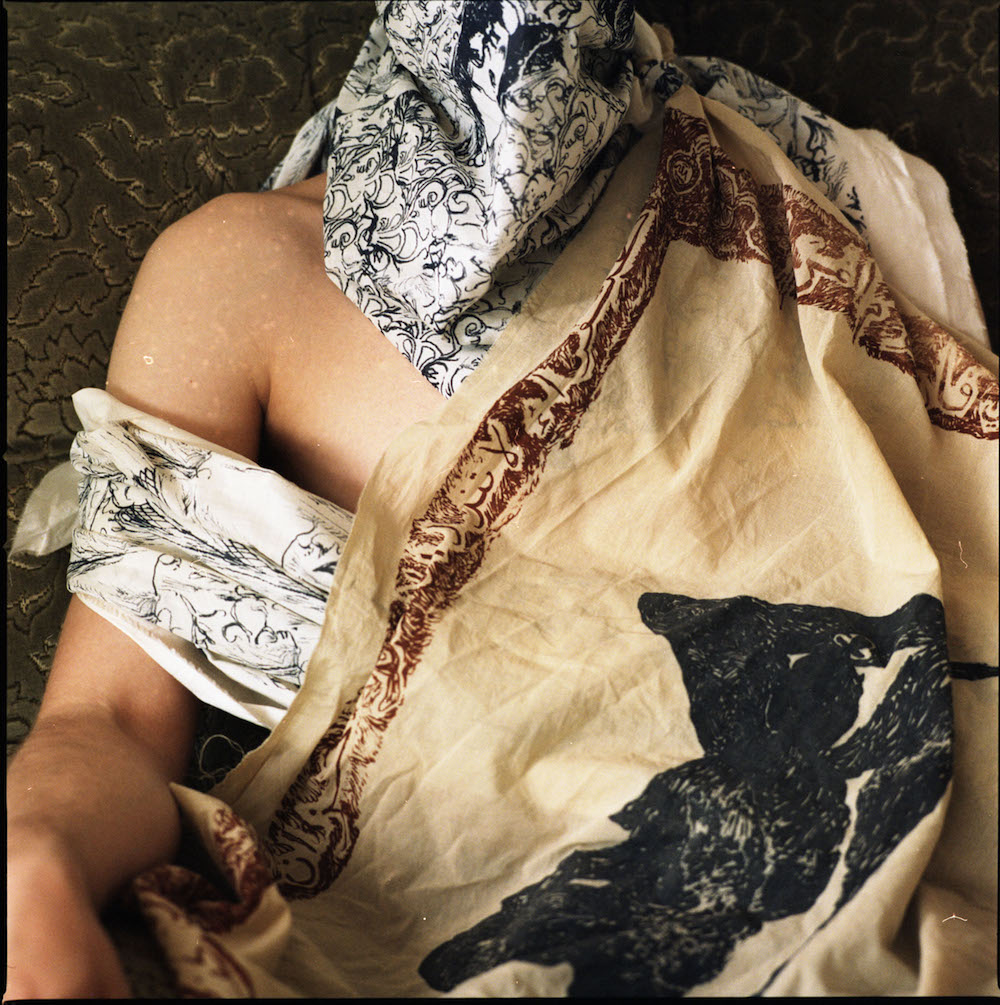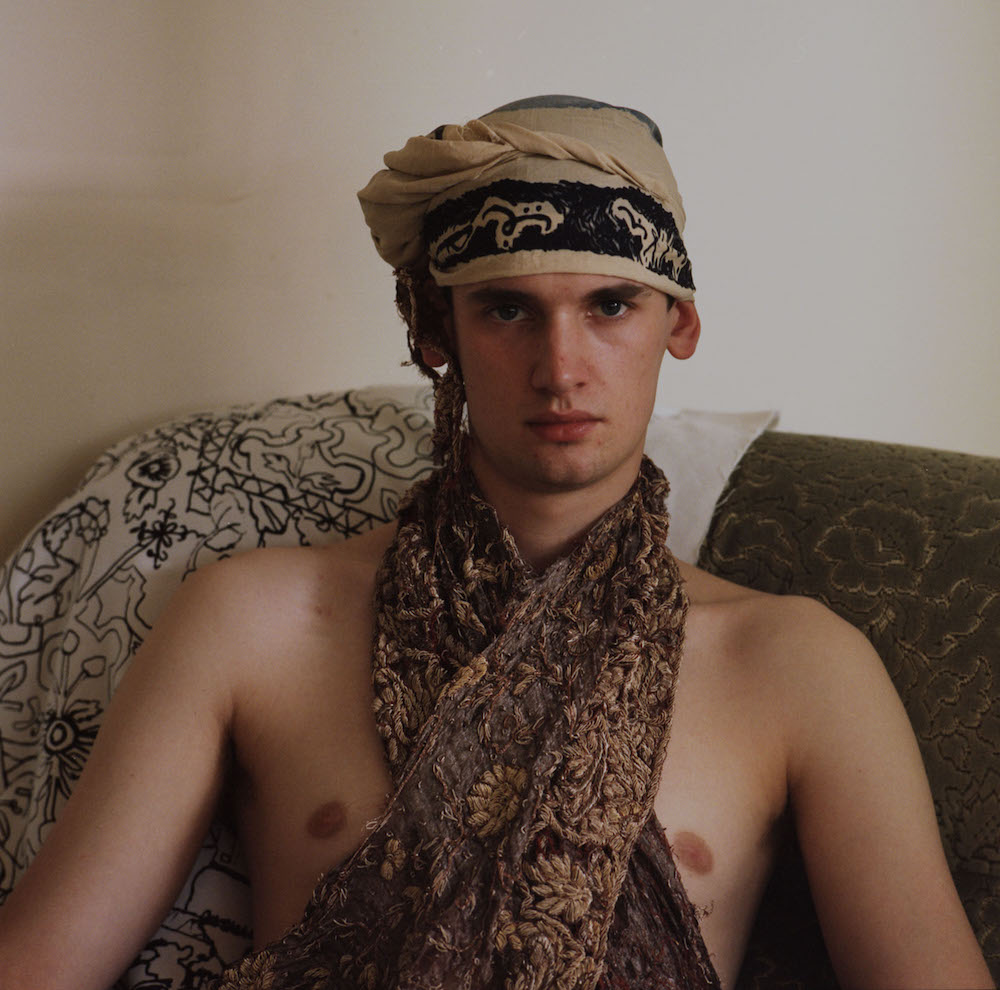We speak to BA (Hons) Fashion Textiles: Print graduate Malik Kydd in our latest interview for LCF BA17. Malik referenced his Iraqi heritage for his final project, using his ancestors as muses, and blending that with modern Western fashion and techniques.

BA (Hons) Fashion Textiles: Print graduate Malik Kydd for LCF BA17.
Can you tell us a little bit about yourself and the moment you knew you wanted to study fashion?
I grew up rurally in a small village in the Kent countryside. I am half Iraqi, half British and moved to London to study an art foundation when I was 18. Having painted a lot and taken life drawing classes from a very young age, my affinity to art was never completely separate from my fascination with clothes and textiles. I have always been obsessed with classic national dress and costume, and while growing up, was enamoured by Arab objects that I found myself surrounded by. I found the sensitivity and glamour of textiles fascinating. When I was a older I learnt more about British and Western designers, who used historical referencing and avant-garde fashions to make social commentary – namely Vivienne Westwood and Alexander McQueen. All these factors combined solidified my desire to study fashion.

BA (Hons) Fashion Textiles: Print graduate Malik Kydd for LCF BA17.
Talk us through your final project…
My project is an exploration of craft processes, a celebration of the true delight of drawing and a reflection of the things I see and love. The research ranged from looking at my mum’s scarves, the art in my house and artists that I like.
What is the story behind your final piece of work?
I wanted to merge a mix of heritage influences with some personal research into products. I chose scarves as outcomes because I think they are enigmatic, and carry a lot of connotations. They allow for a great blank canvas as a print designer who likes to draw. Determining a set number of outcomes was an opportunity to provide boundaries, so I guess the final collection is about personal limitations. There’s a story about a childhood friend and our early creative outlet of writing stories together, which is also linked to some objects in her house. It has a strong narrative of luxury, specifically English-Arab luxury. A lot of the designs are personal, inspired by people close to my like my mum, so it’s an inquiry into the bespoke process. The silhouettes of my garments are largely based on what I would like to wear.
What techniques or theories did you use to create your final piece of work?
I researched Al Nahda Iraqi silver point embroidery. Traditional craft techniques formed a large part of my collection, but the technique is appropriated in a style that I can achieve while reflecting my own drawing style over traditional patterns. I try to act on being sustainable, although it’s definitely not the single driving factor of my design ethics. I like to use found fabrics, it’s reactionary to waste but I do it instinctively because that’s where I find the best materials.
Have you won any prizes?
I was nominated to assist Dutch designer Bart Hess in a research project. This was an incredible opportunity, as I’d been an admirer of the Dutch approach to designing, which is more conceptually focused than my own work, which is aesthetically inclined.

BA (Hons) Fashion Textiles: Print graduate Malik Kydd for LCF BA17.
Have you undertaken any work experience or done a placement whilst at LCF? Where and how did you secure this work experience or placement?
I interned throughout my degree, working for John Alexander Skelton, Roland Mouret and Claire Barrow. I found working an invaluable aspect of my development as a designer and would say that it is equally as important as one’s studies. I contacted all the companies directly, sent out hundreds of CVs, and honestly, believe that the best way to secure a placement is to apply everywhere if you don’t have pre-existing connections. It’s also important to seek out new graduates as they often need support and will be looking for lots of interns – not to mention that their work is often exciting and experimental. It can help you visualise how you will keep stock, manage a budget and manage time in your final year and beyond.
Have you met or been inspired by any speakers from the industry whilst at LCF?
Working with Bart Hess was very inspirational, and his guest lecture was fantastic.
Describe your work and aesthetic in five words…
Painterly, naïve, rich, nostalgic, and messy.
- BA (Hons) Fashion Textiles: Print graduate Malik Kydd for LCF BA17.
- BA (Hons) Fashion Textiles: Print graduate Malik Kydd for LCF BA17.
Do you have a muse? If so, who and why?
I think my muses are my mum’s family, as they feature heavily in photo albums that she has kept from the 1920s to the 1970s, from Baghdad, Beirut and London. Although I know them now as middle-aged people, the way that they are preserved in those albums is immortally stunning to me. I also love the candid photographs of Hashem Al-Madani – his anonymous sitters are all muses to me. I would say equally my friends are my muses. My friend Siobhan who makes zines, and my classmate Moonhee, are totally chic and I find that so inspiring. My friend George McGoldrick makes paintings, and I would say his approach to art, and attitude to our hometown makes him a muse. I think the people I have worked for specifically John Skelton have become influencers and mentors, and I appreciate that greatly.
What influences your style and work?
Those who I have worked for, artists that I like, people who draw, people who look great, and accidents influence me.

BA (Hons) Fashion Textiles: Print graduate Malik Kydd for LCF BA17.
What are your plans for the future?
I want to work abroad, research, and then come back and study a masters. I imagine the next few years will be working a lot of different jobs and absorbing experiences as is the reality for a fashion graduate.
How do you think your course and LCF will help you achieve this?
The network of teachers and classmates will act a foundation for further work.
Have you heard that LCF is moving to east London? What do you think about the move?
I studied at Lime Grove, and love Shepherds Bush and west London because it has an amazing vibe and a great market. However I feel that a purpose built, one site LCF will boost a community feeling amongst students.

BA (Hons) Fashion Textiles: Print graduate Malik Kydd for LCF BA17.
What music do you listen to whilst you’re working? Is there one particular track or artist that you like?
I like to listen to old Egyptian music like Umm Klethoum and Abdel Halim Hafez.
What do you think Brexit means for the fashion industry and studying in London?
I think this depends on long-term outcomes of Brexit, of which we are unsure. It could make securing work placements for UK based students in Europe more difficult, which would be distressing. As far as studying in London goes, it already is difficult! It’s hectic and expensive, it absorbs a huge amount of energy separate to your work, but the schools are fantastic and the industry is exciting. Brexit will no doubt intensify these challenges, but it won’t kill the excitement and should only spark fresh reactionary work.
- Follow LCF BA17 here
- More information on BA (Hons) Fashion Textiles: Print
- LCF is Global
- Find out more about other undergraduate courses at LCF
- Find out more about postgraduate courses at LCF
- LCF Open Days and Events
- Find out more about Funding and Mentoring
- More LCF News stories
- More information on LCF Careers
- Want to write for LCF News? Send your pitches to communications@fashion.arts.ac.uk
Alumni can connect with LCF in the following ways:



